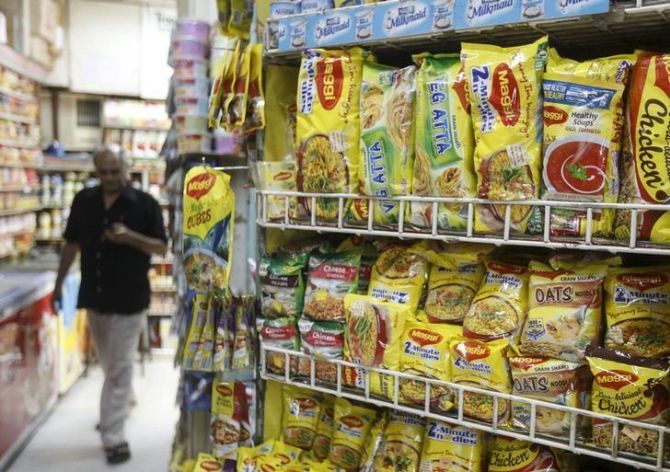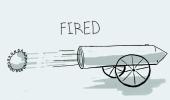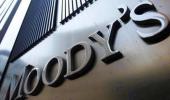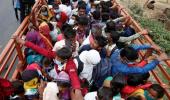In 2019, the growth in sales of the Maggi brand of products surpassed the pre-ban level of 2014, in terms of both volume and value. While, Nestle raised prices of Maggi products by an average 3.1 per cent, its volume rose by 9.6 per cent year-on-year.

In 2019, Nestle sold some 264,000 mt of Maggi products, compared to 254,500 mt in 2014.
The country’s largest food company, Nestlé India, has finally managed to exorcise the ghost of the Maggi crisis that bogged it down four years ago.
In 2019, the growth in sales of the Maggi brand of products surpassed the pre-ban level of 2014, in terms of both volume and value.
Data sourced from its annual report for the year 2019 show it sold around 264,000 tonnes of Maggi products during the year, compared to 254,500 tonnes in 2014.
In value terms, the firm had already surpassed the pre-ban level in 2018 at Rs 3,105 crore, compared to Rs 2,961 crore in 2014.
In 2019, it sold Maggi products worth Rs 3,500 crore.
The company follows a calendar year format for financial reporting.
The Maggi fiasco in 2015, when it was banned by the food regulator, had taken a toll on all its four broad business categories.
While, it managed to recover sales (by volume and value) in the other three categories, Maggi sales had lagged.
The crisis had also impacted its total volume uptake in the intervening years.
This was addressed by the recovery in sales of Maggi, which contributes the largest chunk to the firm’s volume uptake and is the second largest segment in terms of revenue, as total offtake in 2019 stood at 478,400 tonnes - higher than the 458,600 tonnes in 2013.
The firm, however, failed to grow all its categories.
Its beverages portfolio, represented by brands like Nescafe and Nestea, shrank by 2.3 per cent and 1.4 per cent, respectively, by volume and value.
Its largest category by value - milk and nutrition - that contributes nearly 46 per cent to its top line, registered 9 per cent growth with a steep 7.5 per cent average price hike.
While, it raised prices of Maggi products by an average 3.1 per cent, its volume rose by 9.6 per cent year-on-year.
According to Edelweiss Securities analysis, in 2019, Nestle steadily “continued its nutrition, health and wellness journey through strong volume and mix-led growth.
"The company stayed in its path of growth, by investing in cutting-edge science and innovation and taking decisive steps towards renovation”.
The 71 new products that Nestlé introduced under brands like KitKat, Maggi, EveryDay, Cerelac, among others, contributed 3.4 per cent of its sales in 2019, it observed.
“By driving greater agility and rapidly adapting to the changing preferences of consumers, Nestlé brought meaningful differentiation, by improving taste, convenience and nutritional qualities of its products, which saw an increase in consumer trust,” said Abneesh Roy, executive vice-president, institutional equities, Edelweiss Securities.
Nestlé leads in seven of the eight market categories it is present in.
Cerelac (infant cereals), Nan and Lactogen (infant formula), EveryDay (tea creamer), Maggi noodles (instant noodles), Maggi pasta (instant pasta), KitKat, MilkyBar, and Munch (confectionary), and Nescafe (instant coffee) – are market leaders in their respective categories.
Maggi ketchup is second only to Hindustan Unilever’s Kissan, in the domestic market.
Experts said a slew of measures adopted in the past two years paid off.
Apart from strengthening urban distribution and services for all its brands, the firm focused on the rural market.
To add new consumers, the focus has been on improving penetration - adding new outlets and encouraging sampling by launching smaller pack sizes and pushing its products through region-specific promotional schemes.
As a result, the rural market share in Nestle’s sales surged to 25 per cent by end-2019 from about 10 per cent in 2015. It is now looking to generate 35 per cent of total sales from the rural market by 2022.
Another factor that helped was moving the organisation from a pan-Indian framework to a cluster one, dividing the country into 15 clusters.
This strategy of offering localised solutions also entails increased use of local media.
From banking on national media, the company has started using regional media vehicles.
The company credits the power of data analytics for much of its recent success.
Consequently, the India unit, which was already one of the 15 large markets for the Swiss food major, was the fastest growing one in 2019, Nestlé India’s chairman and managing director Suresh Narayanan said earlier.
Photograph: Shailesh Andrade/Reuters











